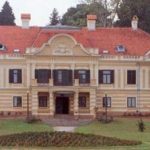A new memorial in Varazdin for Alan Ford fans.
“Translated and adapted by Nenad Brixy”. For fans of the Alan Ford comics, that line in the masthead was crucial. Comics which would be adapted by Brixy were way better than any others. Due to the endeavours of the Trash Association, whose members grew up reading the cult comic book, journalist and writer Nenad Brixy (1924-1984) has been honoured with a memorial plaque at his birthplace in Varaždin. A monument to Alan Ford was unveiled as well, reports Vecernji List on September 14, 2015.
“My father is certainly best known for Alan Ford, though he was never pleased with that since he was a writer who published dozens of novels. He was especially popular in the former Czechoslovakia, where his novel ‘No Entry for Dead Men’ was printed in more than one million copies and was made into a movie”, said Brixy’s son Davor Brixy, who worked with his father on some translations.
Nenad Brixy graduated from a high school in Varaždin, dropped out of university and started writing. He worked for several newspapers, some of which he edited as well, but he especially loved to write humorous crime novels, such as those with an anti-hero Timothy Tatcher. However, he is most famous for the translations of Alan Ford comics, written by Luciano Secchi (Max Bunker) and drawn by Roberto Ravioli (Magnus), which were published by Vjesnik from 1972. Sentences like “Better to live one hundred years as a millionaire than seven days in misery!” and “Hello, Bing! How’s your brother?” entered the popular culture of former Yugoslavia.
“It was a slang which was quite common in Zagreb. However, it was equally understood in the whole of former Yugoslavia, including Belgrade, where it is the only accepted translation. Why was Alan Ford so popular in our country, but not in others? I believe some of it is about the ‘recognition’ of our own behaviour, way of thinking. Italians are similar to us. There are no honest characters, just thieves and fools”, says Davor Brixy.
It is not known how many comic books his father translated. He would sometimes add his own sentences and “tweak” them when Bunker would go astray. Great care was taken so that nothing Nazi would ever be seen, that no US military iconography was shown and that the Russians did not look like the Russians. There was also some self-censorship. “With free translation and adaptation, many sensitive areas were hidden”, he adds.
His father loved sports, especially cycling and tennis. He liked to talk about the American cable television and the large number of sports channels American could watch. “Today, we would probably have to peel him off the television”, jokes Davor.
Alan Ford is current even today. Daily events are often described with Fordist language, characters and plots.










